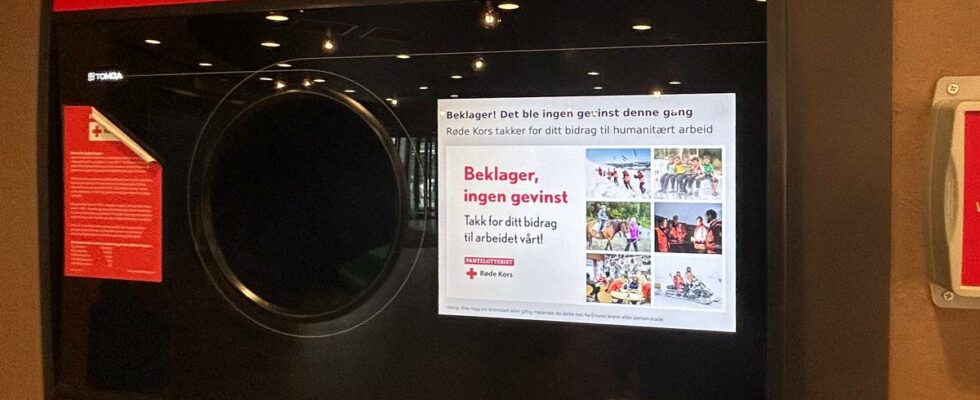Since 2008, we Norwegians have bet on winning millions when we reserve empty bottles and cans. Last year alone, it provided NOK 126 million in income for the Red Cross’s local work. This year, the sum will probably increase to close to 150 million. Today, only the Norwegian Red Cross operates pawn lots. In 2025, the concessions for the national lotteries will be distributed again – with a physical lottery in the Ministry of Culture. The new regulations for gambling, which were introduced in 2023, are written in black and white. The Red Cross fears that they may lose important income if the government doubts that a lottery will decide. – These are funds that go directly to all the activities that the Red Cross runs across the country. Øistein Mjærum says so. He is director of communications at the Norwegian Red Cross. Øistein Mjærum would very much like the Red Cross to continue with the Pantelotterie. Photo: Olav A. Saltbones / Norwegian Red Cross Driven by Thon – We hope that the Norwegian authorities will take some action now, so that we avoid a new lottery for who will get these licenses when they expire in 2025. He believes that there is a desire from both the Storting and the Government for the fewest possible games that can cause people to develop gambling problems. – We believe that there is no lottery that can match the Pantelotteriet on that. You don’t even put money into it, but bottles and cans, says Mjærum. The Pantelotterie is today run as its own company, where the Olav Thon group is responsible for the day-to-day running of the lottery through its own limited company. A third of the income goes to the Red Cross, a third to profits and a third to operations. When the concessions for the national lotteries were distributed for the first time, lotteries were also used. Of those that received a license at that time, only the Pantelotteriet and the Postcode Lottery remain. This is how the income is distributed 35.5% of gross income goes to the Red Cross. This corresponds to 53.08% of income, after deduction of gains. Half of the income for the Red Cross goes to the local associations where the pawn machines are located. 35% of the income from the Pantelotteriet goes back to the public in the form of winnings. 9.75% goes to the shops, for access to the deposit machines and the shop’s efforts in handling the lottery. The remaining share of 19.75% goes to operations, marketing and investments in the operating company Norsk Pantelotteri AS, in which the Red Cross owns 40 per cent and the Olav Thon Group owns 60 per cent. Any surplus is managed by the owners. A lot of money – The development has been formidable. We have so far recorded 850 million for the Red Cross in the 16 years we have been in operation, says daily manager of Norsk Pantelotteri AS, Gaute Langdal. He also believes that it would be completely unreasonable if the Red Cross had to rely on the luck of a lottery in order to continue with the pawn lottery after 2025. Langdal understands that there must be some form of assessment for who should have the valuable licence, but he believes that it is the Red Cross that should be allowed to continue. Langdal believes, among other things, that the aid apparatus for gambling addiction has never had cases connected to the purchase of lottery tickets with a pledge. – I can’t deny that I feel there are better tools than drawing lots when it comes to which games are best suited, says Langdal. State Secretary in the Ministry of Culture, Erlend Hanstveit, will not promise anything. He believes that the principle of drawing lots is in the regulations that were introduced in 2023. – We have received a request from the Red Cross to make changes to this, and we will of course consider them. State Secretary Erlend Hanstveit (Ap). Photo: Terje Pedersen / NTB Large amounts of lottery tickets Another challenge for the Pantelotteriet is that the turnover this year is far higher than the upper limit of NOK 360 million. The lottery is expected to bring in around NOK 410 million – that is, 820 million lottery tickets bought by Norwegians on mortgages. A quarter ticket costs 50 øre. Now they are betting that the government will expand the framework for the game, which the Ministry of Culture is now considering. – We are now working on a proposal to increase the turnover limit, and this will gradually be submitted for consultation, says State Secretary Erlend Hanstveit (Ap). Gaute Langdal in Norsk Pantelotteri AS. Photo: Katrine Lunke / pantelotteriet.no – Did a good job As a former left-back and centre-back at Brann, he is used to things being at stake. He praises the Red Cross for what they have achieved with the Lottery. – It seems that the Red Cross has done a good job. For us, the most important thing is to prevent and limit gambling problems. Today, the Norwegian Lottery Authority, with headquarters in Førde, is responsible for monitoring the Norwegian gambling industry, including the Pantelotteriet. But it is the Ministry of Culture that ultimately decides how the pawn lottery will be from 2026. Other organizations such as Blindeforbundet, Norwegian People’s Aid and others that are approved to operate gambling can then also sign up. – In any case, we must hope that the next concession will not be based on a lottery, says pantelottery manager Gaute Langdal. Having a problem playing? Here you can get help and someone to talk to. Published 27.08.2024, at 09.30
ttn-69
The future of the Pantelotteriet can be decided by lottery – news Norway – Overview of news from different parts of the country

